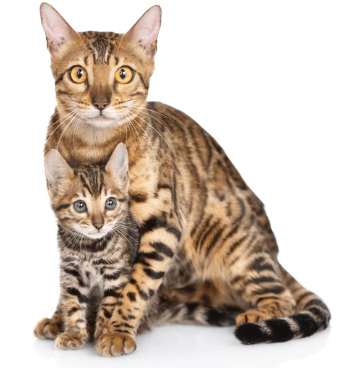
Cats are known for their unique and varied personalities—some are affectionate lap lovers, while others are independent or aloof. While environment and socialization are important factors in shaping a cat’s behavior, genetics play a major role in determining a cat’s temperament. Just as a cat inherits their fur color or eye shape from their parents, many aspects of their personality are written in their DNA.
What Is Cat Temperament?
Temperament refers to a cat’s inherent personality traits, including how they respond to their environment, interact with people and other animals, and cope with new or stressful situations. Key aspects of temperament include:
- Sociability: Whether a cat enjoys interacting with humans and other animals.
- Aggression: How likely a cat is to react with aggression when stressed or threatened.
- Fearfulness: The tendency to be nervous or cautious in new situations.
- Playfulness: How energetic and curious a cat is, particularly in relation to hunting or playful behaviors.
- Vocalization: How much kitty “talks” to communicate with their human.
Genetic Basis
Genetics provide the foundation for many aspects of a cat’s personality. Research shows that temperament traits are often inherited, meaning kittens can inherit their sociability, aggression, or playfulness from their parents.
For instance, a study on domestic cats found that kittens from friendly, outgoing mothers were more likely to be social and confident themselves. Interestingly, the father’s temperament can also influence the kittens, even if the kittens are raised by a surrogate mother. This suggests that both parents pass on traits that affect a kitten’s behavior.
Sociability
One of the most sought-after traits in a pet cat is sociability—their ability to interact comfortably with humans and other animals. Genetics play a significant role in determining whether a cat will be a social butterfly or more reserved. Cats with confident, friendly parents are more likely to be outgoing themselves, whereas cats born to more anxious or aloof parents may inherit these traits.
Aggression
Aggression is another trait that can be inherited. Cats with a genetic predisposition toward aggression may be more reactive or territorial. For example, certain breeds, like Siamese, are known for their strong-willed nature and can be more aggressive under stress, while others, like Ragdolls and Maine Coons, are generally more docile.
Although genetics can predispose a cat to be more aggressive, early socialization and proper care can help manage these tendencies. Nonetheless, genetics remain a core factor in how a cat processes stress and reacts to threats.
Fearfulness
Genetics also influence a cat’s tendency toward fearfulness. Cats that are more skittish or easily frightened often inherit this behavior from one or both parents. This trait can be adaptive in the wild, where caution helps protect them from predators. However, in a domestic setting, excessive fearfulness can cause stress and affect their quality of life. Certain breeds, such as Persians, may be more cautious or shy, while others, like Abyssinians, tend to be bolder and more curious.
Playfulness and Energy Levels
Playfulness, often tied to a cat’s prey drive, is another trait shaped by genetics. Cats that come from active, playful parents are more likely to exhibit high energy levels themselves. Breeds like Bengals and Abyssinians are known for their playful and curious nature, while more sedentary breeds, such as British Shorthairs, are typically more reserved.
Vocalization
Ever wonder why some cats are chatterboxes while others are silent observers? Genetics also play a role in how vocal your cat is. Breeds like the Siamese are known for being highly vocal, using their voices to communicate with their owners. This trait has been passed down through selective breeding, making certain cats more talkative by nature.
Breed-Specific Temperaments
Certain cat breeds are known for specific temperament traits, which have been selectively bred over generations. While individual personalities will always vary, breed can offer some insight into what to expect from your cat’s behavior. For example:
- Siamese: Social, vocal, and active.
- Maine Coon: Friendly, laid-back, and gentle.
- Persian: Calm, quiet, and affectionate.
- Bengal: Energetic, playful, and adventurous.
- Ragdoll: Affectionate, docile, and relaxed.
These breed-specific traits highlight how genetics shape a cat’s personality, but it’s important to remember that even within breeds, individual cats can vary widely in temperament.
How Environment Interacts with Genetics
While genetics definitely plays a good part in a cat’s temperament, early life experiences and environment play a key role in shaping how these traits manifest. The critical period for a kittens socialization period occurs between two to seven weeks of age. During this time, positive experiences with people, other animals, and new environments can help a kitten grow into a confident, well-adjusted adult.
For example, a kitten with a genetic predisposition toward fearfulness can become more confident with proper handling and socialization. Likewise, a naturally aggressive kitten might learn to be more tolerant with early, positive interactions.
However, genetics cannot be entirely overridden by a kittens early treatment and experiences. A genetically shy or fearful cat may never become as outgoing as one born with a sociable temperament, even with the best socialization.
To Summarize
That said, genetics play a significant role in shaping a cat’s temperament, influencing traits like sociability, aggression, fearfulness, playfulness, and vocalization. While environment and early socialization are important factors in shaping a cat’s behavior, many aspects of a cat’s personality are inherited from their parents.
Understanding the genetic influence on your cat’s temperament can help you better care for them, providing the right environment and support for their unique personality. Whether your cat is a playful ball of energy or a quiet, independent observer, their genes are the foundation of the temperament you see every day.
Embrace your kitty’s uniqueness!
Ciao,


